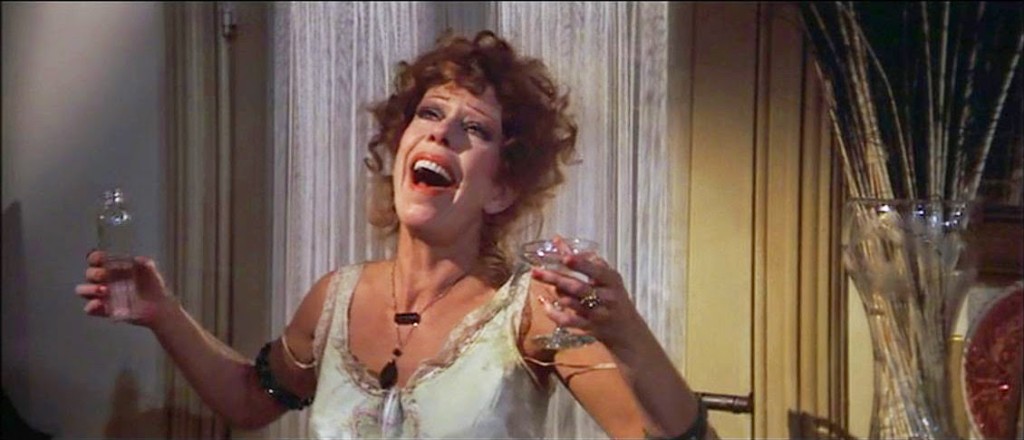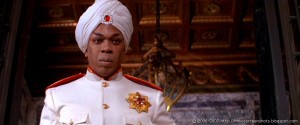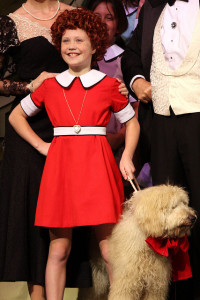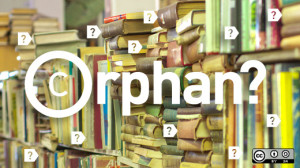What’s This “Orphan Works” Business About?
A couple days ago my Twitter stream blew up with angry declarations about orphan works and pleas for artists to write their representatives demanding that they protect artists’ rights.
I was more than a little surprised. Flabbergasted would be a more accurate description.
I don’t think I’ve ever advised a client about orphan works. Mostly because I rarely advise people who are seeking to license work. I’m much more often talking with people who create work. And for those folks, in my opinion, orphan works are not a serious concern.
Looking at some of the literature that’s being passed around, I’m frustrated that it doesn’t really explain what orphan works are, what the Copyright Office is recommending, or how orphan works can impact an artist making her living from selling and licensing her work.
Thus this post.
I want to be as transparent as possible: I disagree with the stance of the group advocating against the recommendations in the report. I think their assessment of the proposed legislation is hyperbolic. I’m also a big fan (huge) of revising copyright policy in a way that encourages collaboration and sharing while still being respectful of the rights of individual artists.
But you don’t have to agree with me. The purpose of this post is not to advocate a position on proposed copyright reforms. It is simply to provide more information for creators who are curious about orphan works. In fact, if you think too much of my opinion leaked into this post, call me out in the comments.
My goal is for this post to be a helpful factual resource people can use to make up their own minds about the issue. If I’m not meeting my goal, I want to know.
What’s the hubbub about?
The U.S. Copyright Office recently released a report on two copyright policy matters: orphan works and mass digitization. Over the last year or so the Copyright Office has been exploring all sorts of copyright policy in preparation for an overhaul of the U.S. Copyright Act. The last time the Act got a major overhaul was in 1976.
Orphan works are works where it is extremely difficult, if not impossible, to identify and locate the copyright owner of the work. They’re called “orphan works” because the creator has, seemingly, abandoned the work. It is not simply that the piece isn’t signed; it’s that even though the person who wants to use the work has searched to find the copyright owner, they can’t find him or her.
Orphan works are common because there’s just so much stuff that has copyright protection these days and not everyone who owns a copyright knows it or is easily associated with the work. But it’s not common for an artist making her living from her work to have an orphan work. For an artist to have an orphan work, the work would have to have no association with her, and she wouldn’t claim the work as her own.
Orphan works are generally a problem for someone wanting to use a work. If they can’t find the copyright owner to get permission, they have no legal way of using the work. This is in part because copyrights are lengthy (default is life of the creator plus 70 years), so a work is protected for a very long time. The best advice for folks in this position is, essentially, “Don’t use the work, but if you do understand you’re taking on the risk of copyright infringement and could owe thousands of dollars if the owner ever shows up. Or they might not and you’ll be fine. Your call.”
Mass digitization is pretty much what it sounds like. It’s creating digital records of scads of physical works and organizing them in a database. Google Books is an example of mass digitization. Libraries and research facilities also conduct mass digitizations to protect the integrity of their collections. Mass digitization projects pose challenges because of the number of creators involved. Getting permission from that many people, and finding all of them, is difficult.
The report was released in June 2015 and recommended two fixes for orphan works and mass digitization.
OK, what were the recommendations?
For orphan works the report recommended legislation that would limit the liability of a good faith user of an orphan work. The report made recommendations about what a “good faith user” should look like, and what liability a good faith user would have if the owner showed up at a later date to claim their work.
To qualify as a good faith user the report recommended that the individual or entity would have to:
- Conduct a diligent search for the copyright owner. A search would be judged as diligent based on the work the person wanted to use and what type of search would be most fruitful given the type of work at issue. In certain situations, the good faith user may have to show they did several searches and even conducted paid searches. If later a court determines that the search wasn’t diligent, the copyright owner could sue the user for infringement and the user would not benefit from the legislation’s limitation of liability.
- File a Notice of Use with the Copyright Office. They’d have to report, at a minimum, what the work is, a description of the search(es) they conducted to try and find the owner, when they started using it, and how to get in contact with them. They’ll also have to attribute the work to the creator, if they know who that is, and use a symbol on the work that indicates it’s an orphan work.
- Pay the copyright owner a reasonable fee if the owner ever shows up. If a copyright owner discovers their work is being used without their permission, they can file a Notice of Claim with the Copyright Office. Once the Notice of Claim is filed, and validated, the good faith user would have to pay the copyright owner a reasonable license fee for using the work. The report recommends the fee should be “what a willing buyer and a willing seller would have agreed upon immediately before the use began.” This fee would be an alternative to being sued for copyright infringement; if the user didn’t pay, the owner could sue.
If someone uses a copyrighted orphan work without permission and they don’t meet the definition of a good faith user, they can be sued for infringement and be liable for damages.
For mass digitization, the report recommended a pilot program. Organizations who represent the interests of copyright owners would have to qualify to be able to license works to an entity wanting to perform a mass digitization. The license to digitize the works could only be for nonprofit educational and research purposes. No commercial use would be permitted under the pilot. The pilot would apply to literary works, photographs, and “pictorial or graphic works published as illustrations, diagrams, or similar adjuncts to literary works” (i.e., illustrations and such printed in books, plays, etc.). The report recommends that rights owners must be able to put limits on what they license their work for in a mass digitization situation and be able to opt-out entirely if they prefer not to have their work digitized. The Copyright Office posted a Notice of Inquiry, inviting the public to comment on the proposed pilot program.

Ms. Hannigan wishes there were more factual information about copyright available to artists. (Photo (c) Columbia Pictures)
Will this void creator’s copyrights or make common law copyrights invalid?
No. A copyright owner would still own their copyright under both recommendations.
I’ve noticed a lot of concern over the impact the proposed legislation could have on “common law copyrights.” We don’t really have common law copyrights any longer and that’s in part because you get a federal copyright in your creation as soon as you create it. If you decide to register your copyright, you can have access to statutory damages if someone infringes your work, and you have to have your copyright registered if you want to sue someone for infringement. But you have a federal copyright, automatically, in your work even if you don’t register it. That copyright is 100% lawful and allows you to have legal control over your work.
*The exception to you getting an automatic copyright is when you create a work for hire. In those instances the person hiring you to create the work automatically gets the copyright. To be a work for hire, a work has to have certain attributes.*
(Common law copyright can also sometimes refer to states’ copyright laws. I don’t read anything in the report or proposed legislation that would prohibit or preempt a state copyright from applying to a work.)
Would my work be “orphaned” if I don’t register it with the Copyright Office?
No. I don’t read anything in the proposed legislation that would make unregistered works orphan works. The report talks about a “diligent search” including a search of the U.S. Copyright Office’s registration database, but it doesn’t limit diligent searches to searches of registered works.
[Warning, opinion incoming] Based on my reading of the report and the proposed legislation, whether a search is diligent is evaluated in the context of the work the person wants to use. For instance, if a person grabbed an illustration off Tumblr, looked for it in the copyright database and couldn’t find it, then decided to use the work, they would not be protected by the proposed orphan work limitation of liability. Such a search wouldn’t be considered diligent and they would not be able to use the protection of the legislation. (Also in this hypo, they didn’t comply with the notice requirement, so even if it were a diligent search, they still wouldn’t be protected). [/opinion]

The late, great Geoffrey Holder’s got your back. (Photo (c) Columbia Pictures, despite the watermark)
Creators can avoid orphaning their works by leaving a clear trail between themselves and their work. One way to do that is by registering the copyrights in your work, but you can also do it by using licenses and contracts, when appropriate, that describe your work and clearly state you own it; by including your information in the metadata of work you post online; by maintaining a publicly accessible portfolio of your work; and by leaving clear instructions about what you want done with your intellectual property when you die.
Will someone be able to copyright a work they create that uses an orphan work?
Yes, potentially. Derivative works—works that are based on an original work—can be copyrighted and when they are they have their own copyright. However, when a derivative work is copyrighted, the copyright only applies to the new material. It doesn’t reach back and give the copyright in the original work to whomever created the derivative work.
Analogy: My lovely wife makes a fresh blackberry pie, a creation she calls “Pie.” I see the pie cooling in the kitchen and think, “Man, that looks nearly perfect. All it needs is a dollop of whipped cream on top.” I dub my creation “Pie + Whipped Cream.”
Pie + Whipped Cream is a derivative work of Pie. If I could get a copyright in Pie + Whipped Cream, my copyright would only allow me to protect and control the whipped cream portion of my creation, the stuff I added, but it wouldn’t give me control over the pie itself. The copyright to Pie would still belong to Dylan, its original creator.
Is my work automatically eligible for mass digitization?
The report recommends that only collective management organizations should be able to license works for the mass digitization pilot. CMOs are organizations that have a membership of creators and those members have given the CMO permission to license their work. I’m not familiar with any CMOs for graphics or literary work, but the report points to ASCAP and BMI as examples of CMOs for music (which have their own issues).
My guess is that for the pilot to work new CMOs would have to be created. If you don’t want your work involved in mass digitization, the flip answer is: don’t join a CMO. If you’re asked to give any organization permission to license your work on your behalf, read the fine print and ask questions so you don’t inadvertently join a CMO.
The report also says that even if a copyright owner is a member of a CMO, they need to have the ability to limit how their work is licensed or opt out entirely. I interpret the language to mean that in order to legally license works for mass digitization, a CMO must to allow its members to be able to limit how their work is licensed and allow them to opt out of mass digitization licenses if they want, otherwise the CMO couldn’t qualify to issue mass digitization licenses. But to be clear, that’s my interpretation of the language.

Daddy Warbucks thinks government regulation stinks, but he’s gonna read the report on orphan works anyway. (Photo (c) Columbia Pictures)
What should I do?
Read the report. It’s long, but it’s accessible and no one will get mad if you skim the stuff you’re not interested in (Pages 121-124 summarize the proposed legislation for orphan works; the pilot for mass digitization is described in pages 82-102). Neither the proposed legislation for orphan works or the mass digitization proposal is currently before Congress for consideration, but they might be one day.
If you read through the report and feel strongly about the recommendations, one way or the other, write your representatives in Washington and tell them what you think! You can also submit comments to the Copyright Office telling them what you think of the mass digitization pilot. Be a part of this weird representative democracy experiment we’ve been running for the last 239 years. It’s imperfect, but still chugging along.
What do you think of the Copyright Office’s report and recommendations? Share your thoughts in the comments.
Categories: The Rest
Tags: copyright
« The Stories We Tell Ourselves
No FoMO »






[…] Enter Katie Lane, lawyer to the creative community and general smart person when it comes to intellectual property issues. She thought that this latest iteration of proposal/freakout/refractory period was odd, so she went and looked at the recently-released report on orphan works from the US Copyright Office; generous soul that she is, she’s shared her interpretation of the situation, the proposal, the likely outcomes, and how much it’s all a cause for concern. You can read the whole thing here. […]
awesome!
this is so relevant!!
thank you so much, both for your research work and essay, as well as your personal opinions which are so valuable..
Orphan Works affects illustrators and photographers more than any other creative professionals.
The idea that “creators can avoid orphaning their works by leaving a clear trail between themselves and their work” is a misnomer.
Visual art is particularly vulnerable to “orphaning” through no fault of the creator. Artist signatures are removed or cropped, credit lines and copyright notices are separated from the image, illustrations are scanned and placed online without attribution, and metadata embedded in digital images are routinely stripped upon upload (especially on social sharing platforms). Rampant Internet infringement fosters serial orphaning.
Artists aren’t orphaning or abandoning our works — users are.
Copyright law guarantees the right of exclusivity to the artist. Our clients sometimes purchase exclusive rights. This includes the right to privacy, to not respond, and to say no to any user.
Fair use and Section 108 provide much, if not all, of the legal framework needed by libraries, universities, and museums to preserve and fulfill their cultural heritage missions.
More at http://ami.org/professional-resources/advocacy/legal-news
Hi Tonya,
Thanks for your comment and perspective. I disagree that an orphaned work is one where it’s just difficult to identify the creator or owner; using someone’s work without bothering to figure out who it belongs to is just lazy copyright infringement. And not being able to easily identify who the work belongs to is not an excuse for infringement. From my perspective the vast majority of online infringement fits in this lazy category. If there is any way of tracing the work back to the creator/owner, it’s not an orphan work.
I absolutely agree that infringement of visual art, particularly on the internet, is a serious problem. My frustration was the implication that the recommendations on orphan works would somehow make it easier for people to infringe work. The recommendations pose some serious problems for libraries and archives, but I disagree that they pose problems for creators.
Thanks again for the comment and for providing a different perspective.
Best,
Katie
I think people are conflating two different things as being the same:
1) The user who uploads things they do not own, for notoriety or because they are just a sociopath. See the countless people who upload soundtracks to youtube.
2) The “big corporation” who is looking to pillage the public domain, hence wants everything to be declared orphaned, and be absolved of liability for doing so. See Disney.
In the case of the people who take pictures, or scan other peoples pictures and then put it on their own “ad supported” website for profit. The ability to find the original owner is lost on account of the metadata existing outside the digital realm. The person who takes someones work from the artists website, crops the signature, and then uploads elsewhere and presents it as their own are doing the same thing… intentionally making it hard(er) to find the true source. This happens all the time with Tumblr, and people posting images to reddit with imgur.
So while I do support the Orphan Works idea in principle, where educational (eg museums) sources may digitize or retain copies of content. I would not want commercial exploitation of such content without consent (this includes ad-supported websites.)
It’s possible to store metadata in all content at the time of digitization, and it’s abject laziness to not store the copyright in both the metadata and the bitstream (eg watermarks) where cropping or erasure of the watermark would be “more effort” than simply copying it alone. Also the use of stealth watermarks (eg stylized initials) incorporated into illustrations and comics is one way of making sure the breadcrumbs stay intact.
I regularly have to send DMCA notices to imgur and other popular image sharing sites to take down my clients comics being reposted in their entirety. Orphan Works would not change a thing, because my clients produce their own books, and maintain websites with their content already available. Mirroring their content on image sharing sites only benefits the image sharing site, and is a loss of revenue to the artists.
Points that haven’t already been mentioned:
• The Copyright Office’s archives are not searchable by image. A would-be infringer cannot search for registration of an image if they don’t have the exact title and name of the copyright holder of the work.
• Secondary rights to a work and derivative works can be MUCH more valuable than the first time rights. Setting fees through standards on what a willing buyer and seller would have agreed on for first-time rights isn’t fair. The artwork may have gained value in the first use and would be negotiated at a higher price later. To devalue the price of work based on some schedule or what other artists are reporting is to undermine markets that are working well without the help of courts.
• The copyright holder would have to assume the burden of court costs, legal fees, etc. whether or not they win their case against an infringer.
• No artist has the time to police the globe for potential infringements of their work.
• The term nonprofit sounds so benevolent—as if they do it for the love of it, not to make money, but U.S. nonprofits have earnings in the trillions of dollars. Giving nonprofits a blanket license to use images is going to put a lot of visual artists out of business. The purpose of Copyright law includes providing incentive for creative people to produce new work. If hospitals, universities, and other nonprofit institutions no longer need to commission new work or license existing work, there will be a collapse in the creative industry, which is one of our nations greatest and most undervalued assets.
“• The Copyright Office’s archives are not searchable by image. A would-be infringer cannot search for registration of an image if they don’t have the exact title and name of the copyright holder of the work.”
I agree, the Copyright Office needs serious technological upgrades, as do many government entities. There are lobbyists out there specifically devoted to making sure the government remains arcane, obsolete, and inscrutable.
[no comment on your second point because I don’t have expertise or experience with that situation]
“• The copyright holder would have to assume the burden of court costs, legal fees, etc. whether or not they win their case against an infringer.”
This is a big problem with copyright law, and law for people who don’t have oodles of money, in general.
“• No artist has the time to police the globe for potential infringements of their work.”
Yes, but if an infringer is caught, it’s pretty obvious. Artists also don’t have the money to register each and every thing with official copyright status. I think the bigger problem is that independents can’t afford the very basic ability to protect themselves.
“• The term nonprofit sounds so benevolent—as if they do it for the love of it, not to make money, but U.S. nonprofits have earnings in the trillions of dollars. Giving nonprofits a blanket license to use images is going to put a lot of visual artists out of business. The purpose of Copyright law includes providing incentive for creative people to produce new work. If hospitals, universities, and other nonprofit institutions no longer need to commission new work or license existing work, there will be a collapse in the creative industry, which is one of our nations greatest and most undervalued assets.”
From my limited understanding, it depends on which nonprofit. Right now a nonprofit project devoted to digitizing orphan works from 1937-onwards cannot do so legally, as the original creators of the works are dead or otherwise out of pocket. The public cannot access these works easily. The works are in danger of degrading out of existence because certain large companies are still re-inventing licenses they created over a hundred years ago, and morphing copyright law to support the practice.
Other nonprofit uses include infographics such as scientific illustrations and photos to help medical students become doctors, or posters to help nurses explain medical procedures to patients. I would rather not burden students with more debt for the sake of keeping my career afloat, but I will happily charge a university a sum of money for the creation or acquisition of something of mine to keep in their libraries. If a professor or a student runs across something I’ve made online, I have no problem with them keeping it for educational purposes, as long as administrators don’t feel like they have the rights to it to promote their college or whatever.
Having worked in nonprofits for the first few years of my design career…Eww, calling a nonprofit ‘benevolent’ in any way makes me laugh. 😉 I have no fondness for institutions personally. I would still love it if there was a solution to allow archivists to make orphan works digitally available without Disney’s lawyers mucking it up.
This is all my opinion, as this bill gave everyone a scare in 2008 and I don’t think it’s fair to use it as a scapegoat when the bigger problem to me is that average people cannot afford basic copyright protection. It should be -free- to officially register your work, and it should also be technologically feasible for someone to do a reverse-image search of copyright records.
(I am not a lawyer. The following are my opinions and interpretations, do not constitute advice, and are not endorsed by anyone else.)
I’m pretty sure there’s a big difference between “nonprofit use” and “use by a nonprofit organization.” An NPO can’t commission work and then choose not to pay for it or just steal work and use it for promotion (not to say they never do this, but the works’ owners have legal recourse against it). The type of nonprofit use being discussed for digitization would just be an extension of the “nonprofit educational and research purposes” already protected by Fair Use. I’m of the opinion that Fair Use does and should cover digitization for already-protected purposes; the law simply needs clarification to reflect the advancement in technology.
“It should be -free- to officially register your work…”
I disagree. Why should *I* foot the bill to protect *your* work in such a way that gives you greater access to profit from it (i.e. protect your license)? The copyright is automatic, even if not registered; you only register a work because you believe it is valuable and may bring you profits. That hurdle is important, as it keeps the workload on the Copyright Office contained. If we make it “free,” the currently very reasonable costs become much higher, but hidden in our taxes. The fees are currently low enough that any artist producing profitable work can afford to register his copyrights. If they wait until first profit to register a work, the artist never even needs to be in the red (ignoring material costs, which are usually higher than registration fees).
“it should also be technologically feasible for someone to do a reverse-image search of copyright records”
Here we are in full agreement. It *is* feasible, but it should be an available option. The USCO not only needs to help update the laws for technology, they need to leverage that technology!
RE image search, Dylan pointed out that a “good faith” user would have to perform a reasonable search. I think that would reasonably include an image search, so if your material is indexed anywhere, they’re going to find it that way.
Most of your other points are existing issues with copyright law and aren’t affected either way.
“Analogy: My lovely wife makes a fresh blackberry pie, a creation she calls “Pie.” […] The copyright to Pie would still belong to Dylan, its original creator.”
Wait, did you just steal credit for the pie from your wife? Was the pie an orphan work? I certainly hope it wasn’t out of copyright, since that would be some seriously old pie.
Sorry, I misread – irony – the copyright at the bottom; the author of this blog is Katie, and the photos are by Dylan. I’m still confused by how Dylan ended up with the copyright on the pie, though.
Also, I’m a total idiot. I apologise, please ignore my comments. :/
> “What do you think of the Copyright Office’s report and recommendations?”
I think they don’t go far enough and place too much burden on downstream re-users.
Copyright inflation has reached epidemic proportions. The soul of creativity is building on prior work. While this legislation does provide a framework for this building-upon for orphaned works, the requirement to later pay a licensing fee if a negligent creator shows up out of nowhere is a big problem and a huge deterrent.
Katie can you further explain how copyright holders are still protected even though there is mention in the report (maybe page 51 or 52?) that an orphan work can still be recent and the copyright holder does not have to be unknown? I had listened to your interview in the podcast about this and you made a lot of sense about why we shouldn’t worry but now I’m forgetting how you described the example. That may be one of the few or only things in the report that had me wondering. I tried asking Brad Holland a bunch of questions on his blog but he could not actually reference anything solid in the report to answer my questions and told me that all artists would have to search through a database of endless text in The Dark Archive in order to find out if someone registered an infringing work. Sounds a little creepy,.. is that where the government keeps all their information about the secret alien race that’s running the world? Sorry, that was sarcastic. But really, is there even a singular Dark Archive like he is describing that we would all have to search blindly where thieves have infringing stuff registered?
Thanks!
Hi Angela,
Is this the language you were talking about? “Consistent throughout the Office’s study of orphan works has been the belief that any work, regardless of category or age, can potentially be orphaned and, just as importantly, that all categories of orphan works have the
potential to be reused in socially beneficial ways.” (emphasis mine, pg 51)
Vaporware is one example, where a game or piece of software was created by a company, the company goes belly up and the IP isn’t clearly sold off. In that instance it can be very hard (if not impossible) to figure out who owns the copyright to the work. The work is no longer associated with an owner. It’s orphaned.
Another example is a random doodle on a friend’s notebook that someone takes a photo of and shares on Instagram. The photo makes the rounds and becomes popular but because of how it’s shared (and what it is — a doodle not easily identifiable with the artist), it’s difficult (if not impossible) to track down the owner of the copyright in the doodle. The person who took the photo only has a copyright in the photo, so they can’t license use of the doodle separately from the photo; getting their permission to use the photo is likely not enough if you want to make something using the image.
Okay thank you. I guess my next question would be (if you have a moment to answer) how would the process of suing for infringement in a case like that differ depending on whether it’s under current or proposed Orpahan Works law? If someone had made a painting and hung it somewhere, then someone else took a photo of it and shared on Instagram and another party decides to take it and make posters out of it, then the original artist turns up how would it play out under proposed Orphan Works legislation vs. current copyright laws? Both if it had been officially registered with the copyright office and if it had not? If it was, would compensation to the original artist not have those limits that protect the infringing party since it was indeed registered, or would that mean the infringer had not done a diligent enough search? I realize under current law it would be tough to be compensated without a registration, but if you are registered then do you get less if the law changes?
Thanks again for responding, the debate about this makes me want to pull my hair out and supposedly today is the last day to submit letters with suggestions – although maybe that was not true either?
Sorry I didn’t see your comment earlier! The comments the Copyright Office were soliciting were related to something else — what it’s like to protect and monetize visual art. Because the orphan work issue was mostly being talked about in visual arts circles, I think the two things got conflated. Anyway, the CO was only seeking information; they weren’t doing it because of a particular piece of legislation. And the proposed legislation in the Orphan Works Report isn’t currently being proposed or sponsored by any one. You can always find what’s actively before Congress related to copyright on this website.
Under the proposal on Orphan Works, with your hypo about the painting –> photo –> poster situation, I’m gonna say that a diligent search is going to need to at least include a visit to the library of an art museum for help in identifying the artist. And the searcher may have to conduct more than one search depending on the style and age of the painting. But let’s say they do a diligent search and they still come up with nada. Under the proposed legislation the person wanting to sell those posters will need to file with the Copyright Office and use a symbol on the poster that shows it’s an orphan work. If the artist comes across the posters and recognizes the painting they could either (a) contact the poster creator directly saying, cut it out or (2) search the Copyright Office database of people using orphan works (which presumably they’d know to do since the orphan works symbol is on the poster). In either instance, if the painter can prove they own the copyright to the painting, the poster maker will be required to pay a licensing fee for using the painting. If they don’t pay the fee, the painter can use for infringement (assuming the copyright is registered; if it isn’t, they’d need to do that before suing). The fee, the law suggests, is what a reasonable buyer and a reasonable seller would have agreed on before the infringement.
Now let’s say the user didn’t do a diligent search or didn’t file the right paperwork with the Copyright Office, if the painter finds the posters, the painter can register the copyright to the painting and then sue the poster maker. In order to sue, you have to have a registered copyright.
Right now, under the current law, that’s also what the painter would do.
Hope this helps!
That does help, thank you. So basically whether or not the painting had been registered with the copyright office originally, the original painter would be entitled to compensation equaling what a licensing fee would have been but nothing more unless the person infringing does not pay or cooperate. But if the painting were already registered with the copyright office and the infringer did not locate it would that be enough evidence that they did not perform a diligent enough search, entitling the original painter to damages beyond whatever licensing fee would have been agreed on normally or would the original painter still be limited to license fees only even in the case of a pre-existing copyright registration? That’s the part I am not sure about, and I don’t know how accurate a person can get when searching copyright databases if they only have an image with no title or name. I apologize if I am just repeating the same question, but I think the answer you gave might assume the painter had not registered the copyright yet at the time it was found as an orphan work.
[…] What’s This “Orphan Works” Business About? – Orphan works are works where it is extremely difficult, if not impossible, to identify and locate the copyright owner of the work. They’re called “orphan works” because the creator has, seemingly, abandoned the work. Orphan works are generally a problem for someone wanting to use a work. The post talks about all these. […]